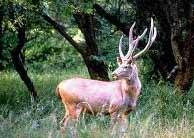
Mount Abu Sanctuary

 Location: Mount Abu
Location: Mount Abu Fauna: Sambhar, Jungle Cat, Small Indian Civet, Wolf, Hyena, Jackal.
Mount Abu Wildlife Sanctuary
The sanctuary comprises the oldest mountain ranges - The Aravali. It was declared as a Wildlife Sanctuary in 1960. Apart from having several sightseeing places this sanctuary is a draw for nature lovers as it has great potential for Eco-tourism, In shape this sanctuary is long and narrow but the top spreads out into a picturesque plateau which is about 19 km. is length and 5-8 km. in breadth. Attitudinally it varies from 300m. at the foot Mil to 1722m. at Gurashikhar, the highest peak of the Aravali Ranges. The rocks are igneous and due the weathering effect of wind and water, large cavities are common the rocks. This feature is typical of Aravali and particularly of Mt. Abu. Toad Rock in Mount Abu is one such example.
Mount Abu has a very rich floral biodiversity starting with xenomorphic subtropical thorn forest at the foot hills to subtropical evergreen forest along water courses and valleys at higher altitudes. These forests consist of 112 plant families with 449 genera and 820 species. Of these, 663 species are dicots while 157 species are monocots. Mount Abu is the only place in Rajasthan where one can observe a variety of orchids. The place is also rich in bryophytes and algae. Three species of wild roses and 16 species of feras some of which are quite rare have also been reported from here. The South- West part of the Sanctuary is rich in bamboo forests.
The sanctuary is rich in herbal medicinal plants also. About 81 species of tree, 89 species of shrubs, 28 species of climbers and 17 species of tuberous plants of medicinal importance have been identified.
A variety of fauna Including highly rare, threatened and endangered species are found in this sanctuary. The past history of Mount Abu indicates the presence of Lion (last recorded in 1872) and Tiger (last reported in 1970). Presently the Panther is the apex predator. Other animals found here are Sambhar, Jungle Cat, Small Indian Civet, Wolf, Hyaena, Jackal, Indian Fox, Common Langoor, Wild Boar, Pangolin, Rate!, Common Mongoose, Indian Hare, Porcupine, Hedgehog, etc. The sanctuary provides an ideal habitat for Sloth Bear, The population of Sloth Bear is increasing regularly as it can be seen while going through the forests or motoring on the road.
The best part of visiting Mount Abu Sanctuary is that, one can experience both nature based tourism as well as pilgrim tourism at one go. Mount Abu has a plethora of temples, particularly Jain temples like Vimal Basahi, Luna Basahi and of course the magnificent Dilwara temple. Mount Abu is also a renowned place of pilgrimage for the Hindu's with temples of Achaleshwar, Adharadevi, Raghunathji and Madhuvan to name just a few.
How to Reach Mount Abu?
By Air: Nearest Airport is in Udaipur (185 km). From here taxis and buses are easily available for Mount Abu.
By Train: Mount Abu Road Railway station is well linked with the cities like Delhi, Ahmedabad, Jaipur, Jodhpur, and Udaipur.
By Road: Mount Abu is well connected with Ahmedabad, Jodhpur, Jaipur, and Udaipur.
























